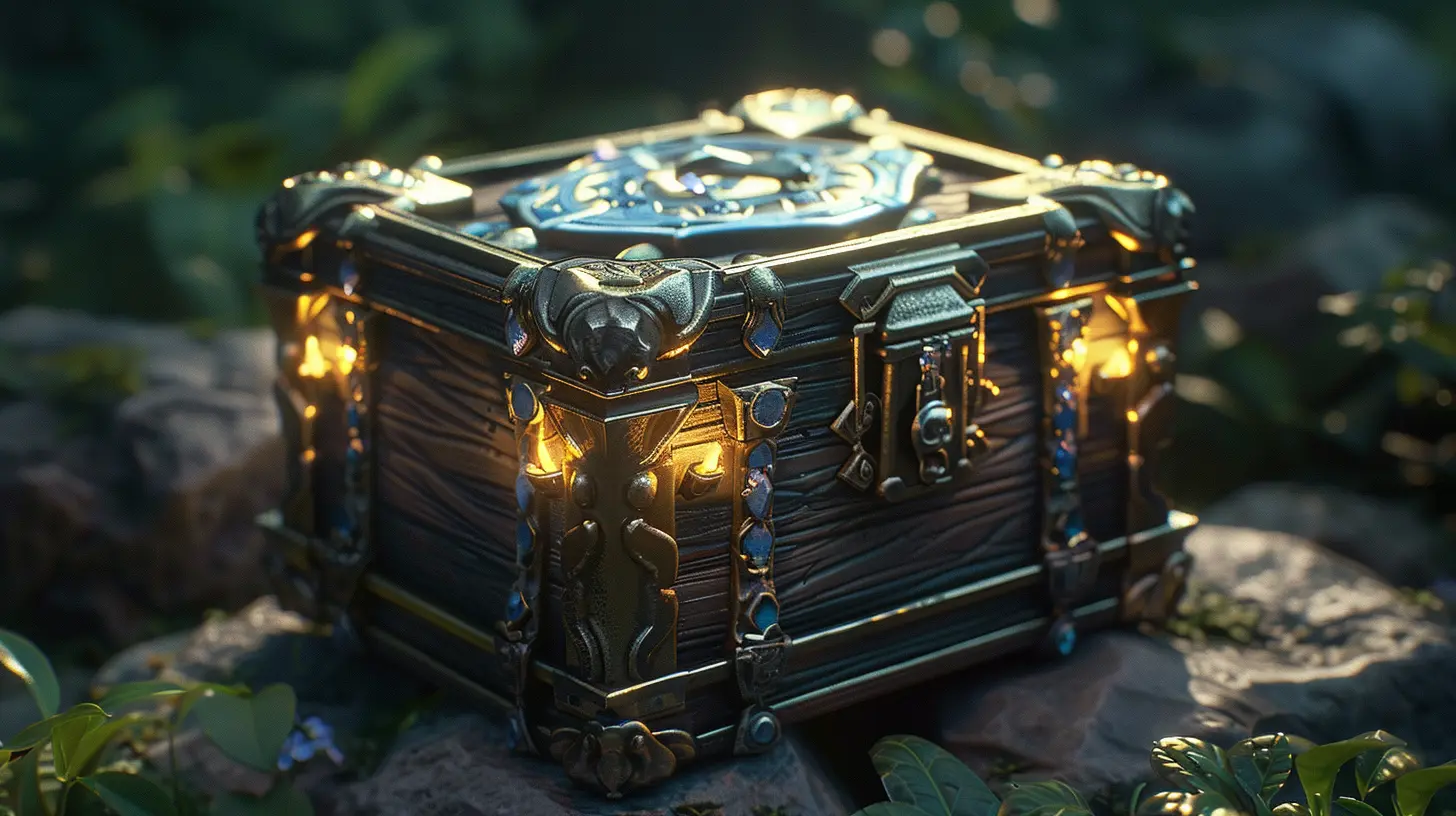Exploring the Legal Battle Over Loot Boxes
14 December 2024
If you’ve ever dived into the world of video games, chances are you’ve encountered loot boxes. You know, those mysterious little treasure chests that promise rare items, cool skins, or even an edge over your competitors—all for a small fee (or sometimes just your sheer luck). But have you ever stopped and thought, "Wait, are loot boxes… legal?" Well, you’re definitely not alone. This question is sparking arguments in courtrooms, governments, and gaming communities around the world.
Loot boxes aren't just a quirky game feature. They're a billion-dollar industry tied to heated debates about fairness, addiction, and consumer protection. And honestly? This legal battle over loot boxes feels like a dramatic multiplayer game in itself—with regulators, game developers, and players all trying to claim victory. So, grab a snack and let’s break it all down.
What Even Are Loot Boxes?
Let’s start with the basics. Loot boxes are virtual items in video games, typically styled as treasure chests, card packs, or some other shiny digital goodie you unlock. The catch? You usually don’t know what’s inside until you buy it or earn it in-game. The contents could be something amazing… or completely worthless. Kind of like rolling dice in Vegas but without the neon lights and cigar smoke.To get them, players might grind through hours of gameplay—or they can whip out their credit card and buy them directly. Naturally, this has drawn comparisons to gambling, and that's where things start to get dicey (pun intended).
Why Are Loot Boxes So Popular?
For game developers, loot boxes are like a golden goose. Want to monetize your game beyond the initial sale price? Toss in loot boxes. They’re like the video game industry’s equivalent of selling collectible trading cards—except these cards exist in a digital universe and players feel a rush every time they open one. It’s all driven by psychology.The random reward system is basically designed to trigger our brains' dopamine receptors. That thrill of “What am I gonna get?” feels similar to spinning a roulette wheel. Even if you don’t land the jackpot, you're tempted to try again. After all, the next box might hold the prize you’re dreaming of, right? It’s addictive, even when you know the odds are stacked against you.
The Roots of the Controversy
But here's the thing. Those very same mechanics? They’re also why loot boxes have ended up under the legal microscope. Many people argue that loot boxes are essentially a form of gambling, and they’re outraged that these features are often accessible to kids. Critics say it's no different from giving a 12-year-old a slot machine and telling them to keep pulling the lever.Players have also raised concerns about fairness. Some games blur the line between skill and luck by allowing players to buy loot boxes that give them stronger weapons or abilities. Suddenly, it’s not just about talent—it’s about who has the deepest wallet. Pay-to-win mechanics are a sure-fire way to frustrate gamers, and loot boxes are often the poster child for this problem.
Loot Boxes: Gambling or Harmless Fun?
So, are loot boxes really gambling? Well, it depends on who you ask. Gambling typically involves three elements: paying money, an element of chance, and the potential to win something of value. Loot boxes definitely tick the first two boxes—but what about the “something of value”?Game publishers often argue that loot box contents don’t technically have "real-world value." But let’s be honest: anyone who's spent hours scouring eBay for rare in-game items knows that’s not entirely true. In some cases, players can trade or sell their loot for actual cash—which definitely doesn’t help their argument.
Legal Battles Across the Globe
Governments around the world have taken wildly different stances on the issue. Some countries are hammering down on loot boxes, while others are saying, “Eh, they’re just digital goodies. What’s the big deal?”Belgium and the Netherlands: Leading the Charge
Belgium and the Netherlands have been the most vocal critics. Back in 2018, Belgium straight-up banned loot boxes in games, citing violations of gambling laws. Game publishers were forced to either remove loot boxes entirely or stop selling those games in the country. Talk about a power move.The Netherlands took a slightly softer approach, but the sentiment was the same. Their regulators ruled that loot boxes in some games violated gambling laws, especially when players could exchange rewards for real money. Game makers had to pay hefty fines or redesign their systems.
The UK: Stuck in Deliberation
Meanwhile, in the UK, the loot box debate has been going back and forth like a never-ending tennis match. Some lawmakers want stricter regulations to protect children, while others argue that loot boxes don’t meet the legal definition of gambling. For now, the government is pushing for better industry self-regulation, but let’s face it—that’s like asking a kid with a candy jar to police themselves.The US: A Patchwork of Policies
The United States? Oh boy. Regulation here is about as consistent as a buggy beta release. Some states, like Hawaii and Washington, have proposed laws to restrict loot boxes, but there’s no nationwide standard. The Entertainment Software Rating Board (ESRB) now includes in-game purchase disclosures on game boxes, but critics say that’s hardly enough to stop predatory practices.The Video Game Industry’s Defense
Game developers aren’t just sitting back quietly. They’ve defended loot boxes as a harmless way to enhance gameplay. They argue that loot boxes fund free-to-play games, support indie developers, and allow for ongoing updates and improvements. Plus, let’s be real: running a big-budget game studio isn’t cheap. Loot boxes are a crucial revenue stream.Publishers have also made some changes to adapt to criticism. Many games now show the odds of getting rare items, and some have introduced systems that prevent players from endlessly buying loot boxes. Fortnite, for example, shifted from random loot boxes to upfront purchases. It’s a step in the right direction, but not everyone’s convinced it’s enough.
How Players Are Fighting Back
Players aren’t just sitting on the sidelines, either. Outrage over loot boxes has led to boycott campaigns, social media backlash, and even lawsuits. Remember the infamous "Battlefront II" controversy? EA faced massive criticism when players accused the game of being pay-to-win due to its loot box system. The backlash was so intense that EA reworked the entire model.Beyond that, players are also using their voices to push for clearer laws. Online petitions and forums are constantly buzzing with debates about loot box ethics. It’s a reminder that, at the end of the day, gamers hold a lot of power when they band together.
The Future of Loot Boxes: What’s Next?
So, where does all this leave us? Honestly, the future is still up in the air. As more governments investigate loot boxes, we’ll likely see stricter regulations, especially in regions like Europe. Meanwhile, game developers may lean toward alternative monetization models like battle passes or cosmetic-only purchases to sidestep these legal minefields.One thing’s for sure: this isn’t just a passing trend. The loot box debate goes beyond gaming—it touches on consumer rights, corporate responsibility, and even mental health. And as the industry evolves, you can bet that players, lawmakers, and developers will keep clashing over where to draw the line.
Final Thoughts
Whether you see loot boxes as harmless fun or a slippery slope toward gambling, there’s no denying their impact on the gaming world. They’ve sparked heated debates, changed how games are made, and probably drained a few wallets along the way. But at the end of the day, we, the players, have the power to demand better. After all, gaming should be about fun, not frustration—or financial ruin.all images in this post were generated using AI tools
Category:
Loot BoxesAuthor:

Jack McKinstry
Discussion
rate this article
14 comments
Runeveil Sullivan
The ongoing legal battle over loot boxes highlights critical concerns regarding consumer protection and ethical game design. As regulators scrutinize their resemblance to gambling, developers face increasing pressure to balance monetization strategies with player trust. This conflict could shape the future of in-game purchases and player engagement significantly.
February 5, 2025 at 5:03 AM

Jack McKinstry
Absolutely, the evolving legal landscape around loot boxes is crucial for both consumer protection and ethical game design, as it challenges developers to innovate while maintaining player trust. This will indeed influence future monetization strategies and overall player engagement.
Ulysses Jones
Great insights on the complexities of loot boxes and their legal implications—essential reading for gamers!
February 1, 2025 at 5:56 PM

Jack McKinstry
Thank you for your feedback! I'm glad you found the insights valuable.
Vienna McQuillan
Great article! The complexities surrounding loot boxes and their legal implications are fascinating. It’s crucial to consider the impact on both players and developers as the debate unfolds. Thank you for sharing!
January 29, 2025 at 6:02 PM

Jack McKinstry
Thank you for your thoughtful comment! I appreciate your insights on the complexities of loot boxes and their implications.
Nix Rodriguez
Understanding the legal implications of loot boxes is crucial for gamers and developers navigating this evolving landscape.
January 25, 2025 at 4:59 PM

Jack McKinstry
Absolutely! As the legal landscape surrounding loot boxes continues to evolve, it's essential for both gamers and developers to stay informed to navigate potential risks and compliance challenges effectively.
Oriana Schultz
This article effectively highlights the complexities of loot box regulations and their implications for gamers.
January 21, 2025 at 4:36 AM

Jack McKinstry
Thank you! I'm glad you found the article insightful. Loot box regulations are indeed a crucial topic for both gamers and the gaming industry.
Noah McGee
This article sheds light on the complex legal landscape surrounding loot boxes in gaming. It’s fascinating to see how this issue intertwines with consumer protection and gambling laws. As gaming evolves, it’s crucial for developers and regulators to engage in meaningful dialogue to create a fair environment for players.
January 18, 2025 at 4:41 PM

Jack McKinstry
Thank you for your insightful comment! Engaging discussions between developers and regulators are indeed essential for navigating the evolving landscape of loot boxes and ensuring player protection.
Pia Beck
Great article! The legal nuances surrounding loot boxes are incredibly complex and impact both the gaming industry and players. It’s essential for us to understand these developments, as they shape the future of gaming. I appreciate the balanced perspective you provided and look forward to seeing how this unfolds.
January 13, 2025 at 5:34 AM

Jack McKinstry
Thank you for your thoughtful feedback! I'm glad you found the article insightful. The evolving legal landscape is indeed crucial for both gamers and the industry.
Grayson Johnson
Ah, the classic ‘pay to win’ debate! If only the gaming industry put as much effort into creativity as it does into dodging regulations. Let’s call it what it is: gambling!
January 10, 2025 at 5:32 PM

Jack McKinstry
Thank you for your comment! The debate over loot boxes certainly raises important questions about creativity and regulation in the gaming industry. Balancing innovation with ethical practices is crucial for a healthier gaming environment.
Rosalie Jimenez
Great article! The discussion around loot boxes is so timely and important. I appreciate how you break down the complexities of the legal battle. It’s fascinating to see how gaming and law intersect. Looking forward to more insightful pieces!
January 7, 2025 at 4:51 PM

Jack McKinstry
Thank you for the kind words! I’m glad you found the article insightful. Stay tuned for more on this important topic!
Parker McNaughton
Who knew gaming could spark courtroom drama? If only judges dropped loot boxes instead of gavel slams—imagine the surprises! Game on, legal eagles!
January 3, 2025 at 5:49 AM

Jack McKinstry
Thanks for the fun comment! It's fascinating how gaming and law intersect—definitely a realm full of surprises! Game on indeed!
Uriah McQuillan
Loot boxes: the casino of gaming or a fun surprise? As legal battles unfold, it’s clear: not all treasures are worth the risk.
December 28, 2024 at 5:37 AM

Jack McKinstry
Loot boxes straddle the line between entertainment and exploitation, highlighting the need for clear regulations to protect players from potential harm while enjoying gaming.
Farrah Newman
This article sheds light on a crucial issue in the gaming community. Loot boxes can significantly impact players, especially younger ones. I'm grateful for the transparency this discussion brings, as we navigate the fine line between fun and fairness in gaming. Thank you for addressing this!
December 19, 2024 at 4:36 PM

Jack McKinstry
Thank you for your thoughtful comment! I'm glad the article resonated with you and highlighted the important balance between enjoyment and fairness in gaming.
Desiree McFarlin
The legal debate surrounding loot boxes highlights important concerns about player protection and the potential for gambling-like behavior in gaming. While some regulations could enhance consumer safety, it's crucial to ensure that any measures do not stifle creativity or innovation within the gaming industry. A nuanced approach is essential.
December 15, 2024 at 5:39 PM

Jack McKinstry
Thank you for your insightful comment! Balancing player protection with innovation is indeed a critical aspect of the ongoing discourse on loot box regulation. A nuanced approach can help achieve both goals.
Ulysses Newman
This article sheds light on a crucial topic in gaming today. The legal discussions surrounding loot boxes reflect the industry's evolution and its impact on players. It's essential for us as a community to stay informed and advocate for fair practices. Together, we can shape a better gaming future!
December 15, 2024 at 3:31 AM

Jack McKinstry
Thank you for your insightful comment! I completely agree that staying informed and advocating for fair practices is vital for our gaming community. Together, we can drive positive change!
MORE POSTS

Why PlayStation Exclusive Games Are Better on PS5

Game Overhaul: Exploring the New Playable Factions and Races

Understanding the Latest Game Patch: What Every Casual Player Should Know

How to Stay Ahead of the Clock in Time Management Games

The Evolution of Time Management Games: What's New in the Genre

Balancing Form and Function: A Guide to Optimizing Character Builds

The Realism in PlayStation Exclusives: From Facial Animation to Physics

Seasonal Update Adds New Events and Time-Limited Challenges

Why Open World Games Are the New Standard for Immersive Storytelling